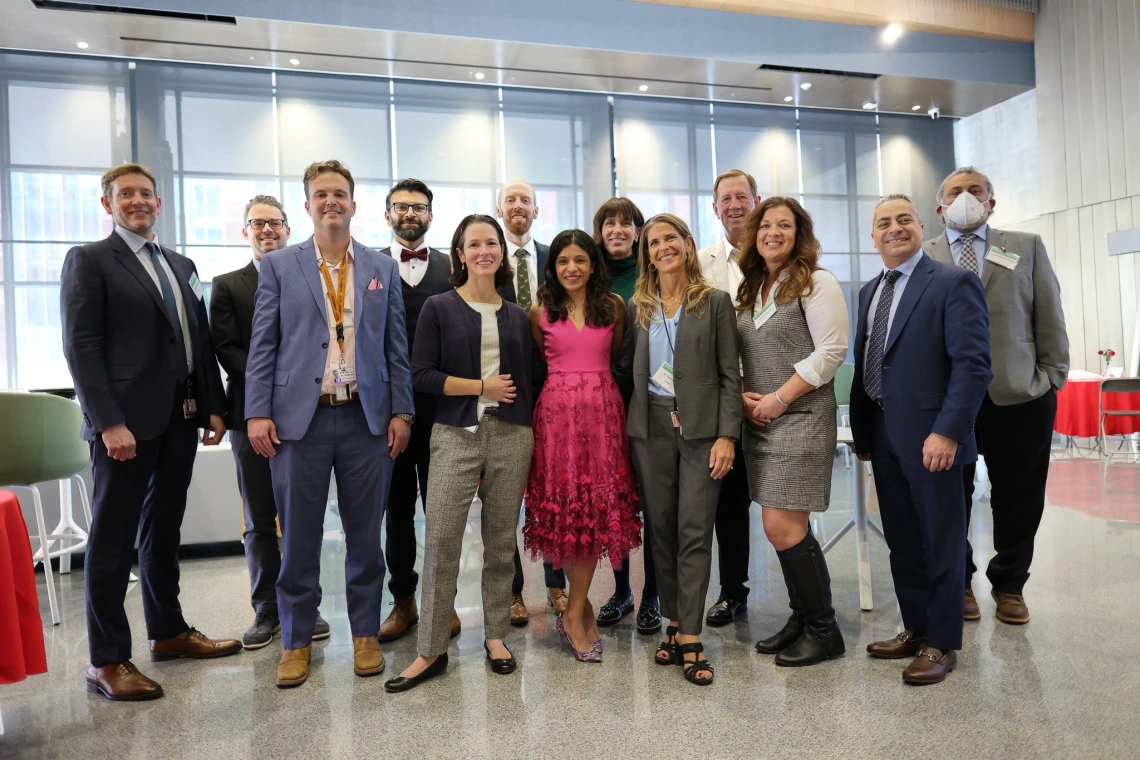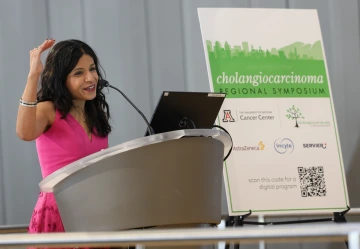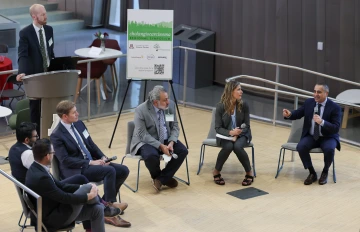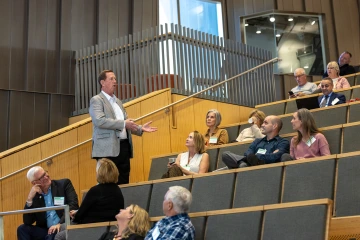Collaborations are key for curing cholangiocarcinoma
Cholangiocarcinoma Foundation and UArizona Cancer Center join to bring vital regional symposium to Tucson

Speakers from the Cholangiocarcinoma Regional Symposium addressed issues such as local therapies in Cholangiocarcinoma, and the future of targeted immunotherapy.
“No one institution, no one investigator, no one scientist is going to solve this problem. It is going to be a global collaboration."
–Stacie Lindsey
Founder and CEO, Cholangiocarcinoma Foundation
With a rare and highly fatal bile duct cancer called cholangiocarcinoma, partnerships are key for both clinicians and patients.
That’s how the Cholangiocarcinoma Foundation changed the course of the disease –– by creating a national network where the University of Arizona Cancer Center and other cancer centers throughout the world can collaborate on their successes and lessons from their studies in order to move closer to a cure.
In early December, more than 200 physicians, oncologists, nurses, researchers, patients and caregivers attended the Cholangiocarcinoma Regional Symposium held for the first time at the UArizona Health Science Innovation Building.

Dr. Rachna Shroff introduces speakers at the Cholangiocarcinoma Foundation regional symposium.
“It's incredible to think about the things that the Cancer Center has done in partnership with the foundation,” said Rachna Shroff, MD, FM, FASCO, interim clinical affairs director of the University of Arizona Cancer Center, professor with tenure in the UArizona Department of Medicine, chief of the Division of Hematology and Oncology, medical director for the Oncology Service Line, and associate dean for Clinical and Translational Research for the University of Arizona College of Medicine – Tucson.
About 8,000 people are diagnosed with cholangiocarcinoma in the U.S. each year. According to the Cholangiocarcinoma Foundation, cholangiocarcinoma starts in the bile duct, a thin tube that reaches from the liver to the small intestine. The major function of the bile duct is to move a fluid called bile from the liver and gallbladder to the small intestine, where it helps digest the fats in food.
At the symposium, Cholangiocarcinoma Foundation founder Stacie Lindsey, CEO, said that she created the foundation to address the disease her brother died from in 2007. As she drove him home from his last treatment, he suggested she take her research and create a foundation.
“I really was just thinking about him, and his family and our family, but he was thinking about all those who would come later,” she said.
Lindsey said the Cholangiocarcinoma Foundation focuses on two pillars: patients and their caregivers, and research and breakthroughs.
“No one institution, no one investigator, no one scientist is going to solve this problem. It is going to be a global collaboration,” Lindsey said. “I'm really working hard to make that happen.”
At the foundation, they also have an extensive network of mentors who are ready to assist cholangiocarcinoma patients and their caregivers. Since August 2021, CCF has distributed 2,000 care kits to patients who have signed up. They also send patients a free 100 questions and answers book written for people without a medical background.
Melinda Bachini, chief patient officer at the Cholangiocarcinoma Foundation and a survivor of the disease, said that the foundation has many educational videos that take complex topics and distill them into digestible information for new patients and caregivers.
“We have all sorts of online and virtual support groups, and we now have two patients support groups a month,” Bachini said. “If you cannot find one on there (the CCF website) reach out to us, we can get you the schedule.”
Addressing cholangiocarcinoma in the region
The regional symposium speakers also included Aaron Scott, MD, associate professor of Medicine, chief of GI Medical Oncology and UACC member, who discussed the current landscape for advanced CCA. Kelley Rone, DNP, RN, from the Mayo Clinic Arizona, spoke on approaches to hyperbilirubinemia. Junaid Arshad, MD, assistant professor of medicine in the UArizona Division of Hematology and Oncology in the College of Medicine – Tucson and UACC member spoke about targeted therapies. Anthony El-Khoueiry, MD, associate professor who specializes in colorectal cancer in Medical Oncology at the University of Southern California Comprehensive Cancer Center and associate director of clinical research discussed the future of targeted and immunotherapy for cholangiocarcinoma.
Shamar Young, MD, associate professor of medical imaging, division chief of Vascular and Interventional Radiology at the UArizona College of Medicine – Tucson and UACC member spoke about liver directed therapies. Taylor Riall, MD, PhD, FACS, professor and chief of the Division of General Surgery and Surgical Oncology at the UArizona, College of Medicine – Tucson and UACC member discussed surgical management of cholangiocarcinoma.
Robin K. Kelley, MD, professor of Clinical Medicine at the Helen Diller Family Comprehensive Cancer Center at the University of California, San Francisco, talked about combining immunotherapy to augment response.

Researchers simulate a patient case study during the symposium.
At the end of the symposium, Drs. El-Khoueiry, Scott, Riall, Woodhead, Khreiss, Arshad gave a case presentation and panel discussion as they do during a medical consultation moderated by Matthew Greer, MD, assistant professor of Radiation Oncology at the UArizona College of Medicine – Tucson and UACC member. They examined MRIs and PET scans of a previously healthy 30-year-old man with no medical history prior to his abdominal pain and the discovery of cancer. Together, the clinicians discussed surgical options, chemotherapy regimens and other treatments, postoperative options. Within 15 minutes, they were able to create action options for the patient who they revealed eventually survived and is doing well.
William Shaw, president and general manager at KVOA-TV, also spoke about his experience with cholangiocarcinoma and navigating the disease with the assistance of Dr. Shroff and the team at the University of Arizona Cancer Center.
He said he was grateful that the Cholangiocarcinoma Foundation had regional symposiums throughout the country for patients, caregivers, clinicians and researchers who cannot attend the 2024 Annual Symposium, which is in Salt Lake City, Utah, on April 17–19.

Bill Shaw discusses his experience with cholangiocarcinoma.
It's important to me personally, because I learned one heck of a lot by coming to this conference,” Shaw said. “I was trying to give people the perspective of the patient versus the expertise of the doctors. What I came away with were all the facts behind the disease.”
He said that most patients see the doctor for a short visit, but they don’t realize the hours of consultation that go on regarding their care by their physicians behind the scenes.
“The collaborative process between the support staff, oncology, radiology and surgeons is unbelievable,” Shaw said.
For more information on the Cholangiocarcinoma Foundation, visit their website.



